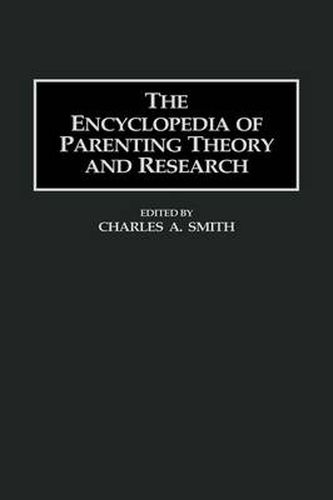Readings Newsletter
Become a Readings Member to make your shopping experience even easier.
Sign in or sign up for free!
You’re not far away from qualifying for FREE standard shipping within Australia
You’ve qualified for FREE standard shipping within Australia
The cart is loading…






The word parent is most often used to refer to a biological relationship with a child. But the word parent , like mother and father , can also invoke acts of caring, nurturing and protecting. When we say, That child needs a father , we imply that the child needs a relationship with a man capable of fathering. This emphasizes a social and emotional relationship, not merely a biological one. Parenting means assuming responsibility for the long-term care of a child. Becoming a parent is relatively easy. But parenting is a skill that is learned and improved over a lifetime. Moreover, parenting is a skill that becomes more complex in response to the demands of a changing society. Some elements of successful parenting are relatively abstract and seem to remain fairly constant across different generations. But with the rise of new social problems and the proliferation of various threats to the integrity of the nuclear family, the parenting strategies of a generation ago are not necessarily effective today. Parenting has also received growing amounts of attention from researchers, and what was once considered chiefly an art is now also recognized for being a science. Our knowledge of parenting has increased significantly in the last few decades, and new developments continue to be made daily. This reference book provides a comprehensive summary of what we know about parents and the parent-child relationship. Through more than 240 alphabetically arranged entries, the volume synthesizes the present state of research on parenting. Each entry is written by an expert contributor and provides an authoritative overview of a particular topic. Entries are related to child activity, child outcomes, child states, parent behaviours, parental situations, external and community factors, systemic concerns, the transition to parenthood, available resources, and a number of persons who have added to our knowledge of the field. The entries draw on a wide range of disciplines, including psychology, education and sociology. Each entry closes with a brief bibliography and the volume concludes with a selected list of works for further reading.
$9.00 standard shipping within Australia
FREE standard shipping within Australia for orders over $100.00
Express & International shipping calculated at checkout
The word parent is most often used to refer to a biological relationship with a child. But the word parent , like mother and father , can also invoke acts of caring, nurturing and protecting. When we say, That child needs a father , we imply that the child needs a relationship with a man capable of fathering. This emphasizes a social and emotional relationship, not merely a biological one. Parenting means assuming responsibility for the long-term care of a child. Becoming a parent is relatively easy. But parenting is a skill that is learned and improved over a lifetime. Moreover, parenting is a skill that becomes more complex in response to the demands of a changing society. Some elements of successful parenting are relatively abstract and seem to remain fairly constant across different generations. But with the rise of new social problems and the proliferation of various threats to the integrity of the nuclear family, the parenting strategies of a generation ago are not necessarily effective today. Parenting has also received growing amounts of attention from researchers, and what was once considered chiefly an art is now also recognized for being a science. Our knowledge of parenting has increased significantly in the last few decades, and new developments continue to be made daily. This reference book provides a comprehensive summary of what we know about parents and the parent-child relationship. Through more than 240 alphabetically arranged entries, the volume synthesizes the present state of research on parenting. Each entry is written by an expert contributor and provides an authoritative overview of a particular topic. Entries are related to child activity, child outcomes, child states, parent behaviours, parental situations, external and community factors, systemic concerns, the transition to parenthood, available resources, and a number of persons who have added to our knowledge of the field. The entries draw on a wide range of disciplines, including psychology, education and sociology. Each entry closes with a brief bibliography and the volume concludes with a selected list of works for further reading.